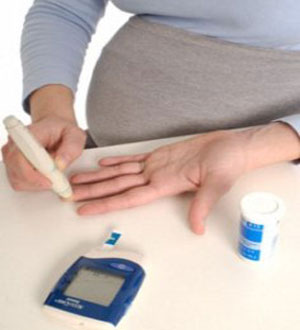In simple terms, what happens when you have diabetes is your body doesn't have the capabilities to product the correct amount of insulin in your body so that it can regulate blood sugar levels throughout your day. This may seem like something that is not very hard to manage, but it is in fact quite difficult. Remember the tips listed in the article to make it easier.
 Make sure you talk with your physician if you're pregnant and feel you might have gestational diabetes. If you don't control your diabetes, it harms both you and your baby. Your doctor can advise you on how to eat and if you need any medication.
Make sure you talk with your physician if you're pregnant and feel you might have gestational diabetes. If you don't control your diabetes, it harms both you and your baby. Your doctor can advise you on how to eat and if you need any medication. - Glucose tablets are an option for the hypoglycemic. These tablets generally come in small containers that fit in a purse or pocket, and can quickly boost your blood glucose levels.
- Diabetes can be hard to manage at first. If you put all of your readings as well as treatments in a journal, you can take that to your doctor, and it will be very beneficial. Take the journal with you to your doctor so it helps him to understand where you are with your condition, and also, he will be able to manage your techniques more carefully.
- Never rely only on urine ketone tests to measure the amount of glucose in your blood. A high ketone level indicates that your blood contains 200 milligrams of sugar per deciliter. Readings should be recorded to find patterns and to give your physician an accurate report.
- Smoking is not a habit a diabetic should start, or continue. Diabetes and the effects of smoking can both inhibit blood flow. Even worse, it can cause quite a spike in blood sugar levels. Your doctor can help you to determine the best way to beat your nicotine addiction.
- Seek out new ways to keep your favorite dishes but have them healthier. There is absolutely no reason to stop eating all of your favorite foods. Research different ways to prepare these foods without the unhealthy ingredients. Diabetic cookbooks are full of scrumptious recipes designed for people with diabetes.
- Make your favorite comfort foods more diabetes-friendly. Many people find the most difficult aspect of diabetes is its restrictive diet. Many assume they have to stop eating these favorite foods entirely. For others, the temptations of their favorite dishes will overcome dietary restrictions. The healthiest solution is using tasteful substitutions to recreate more healthy versions of your favorite dishes. Many dishes can turn into diabetes-friendly meals by using healthier ingredients as alternatives when cooking.
- Diabetics are at risk of many foot problems. Being careless with your feet, such as walking around barefoot, can lead to complications which might have to be cured through amputation. If you follow these suggestions, you can maintain good health for your feet despite your diabetes.
- Watching your diet carefully is important when you are diagnosed with diabetes. Your blood sugar will be effected differently by various foods, so keep track of what you eat and how it will impact your blood sugar. Large meals will need larger doses of insulin to process, and small meals require less. If you watch your meals, you can actively manage your glucose levels.
- Add vinegar to the food you eat. Adding just a bit of vinegar can keep your glucose levels from rising as quickly when you eat. Vinegar works by slowing down the digestion of starch, keeping food in your stomach for a longer period of time.
- Changing your diet can be a great way to help lower your risk factor of contracting diabetes, and switching out fats and sugars with fiber is a great place to start. Choose whole wheat and whole grain foods over their processed counterparts, like white bread, which have a dangerously high glycemic index. Study after study concludes that individuals who eat more whole grain have a much lower risk of contracting diabetes.
- Don't stuff your face with food, if you suffer from hypoglycemia. While it is important to get adequate sugars from the diet, excess sugar gives higher blood sugar levels, and this causes even more negative problems for the body.
- It is important to not depend solely on the urine ketone test for examining your blood sugar. High ketone levels in the urine suggest just that your blood glucose is approximately greater than 200 milligrams per deciliter (mg/dl). Begin using a home glucose gauge to measure the exact amount of glucose inside your blood as an alternative. The American Diabetes Association (ADA) looks at this type of assessment to be a lot more precise compared to urine evaluation.
Take some of the stress out of living with diabetes by applying the above tips to your everyday routine. Use these tips to continue living a healthy, happy and fulfilling life despite your diabetes.
No comments:
Post a Comment